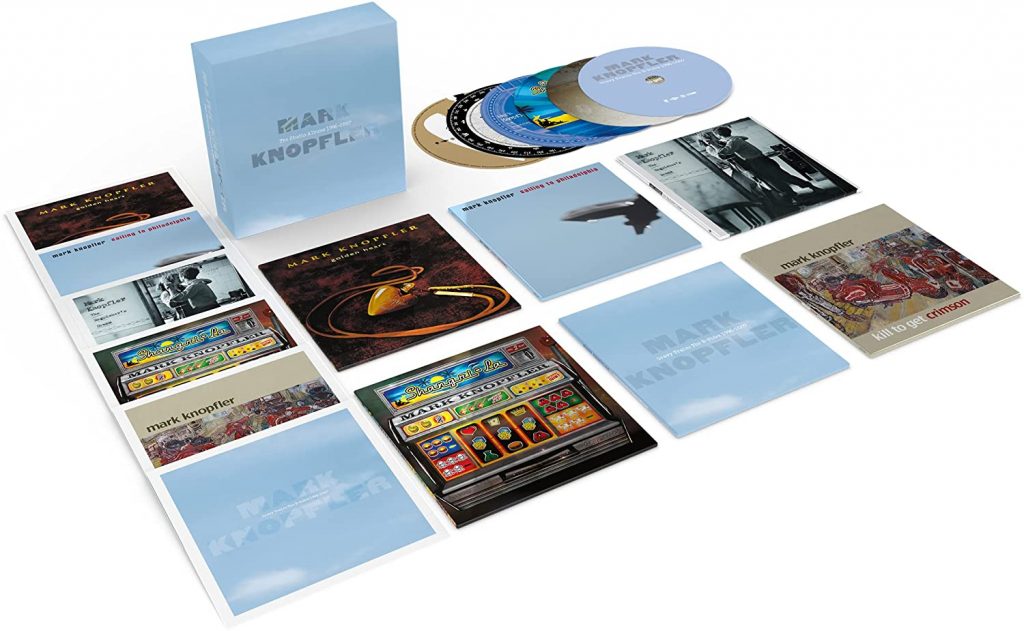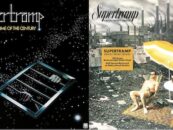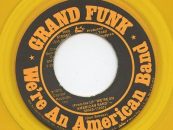 Last year witnessed the release of Dire Straits’ The Studio Albums 1978–1991, and now we have Mark Knopfler’s The Studio Albums 1996–2007, which features the first five solo efforts that the group’s leader issued in the wake of its demise. Unlike the Dire Straits box, this one adds a bonus: an album that collects the B-sides from the singles released with these records.
Last year witnessed the release of Dire Straits’ The Studio Albums 1978–1991, and now we have Mark Knopfler’s The Studio Albums 1996–2007, which features the first five solo efforts that the group’s leader issued in the wake of its demise. Unlike the Dire Straits box, this one adds a bonus: an album that collects the B-sides from the singles released with these records.
While the group’s box embraces all its studio material, however, this anthology doesn’t come close to painting a full picture of Knopfler’s solo years. That’s because his discography is a lot bigger than his former band’s: he has released four albums in the years following the period covered by this set, and that’s not counting his soundtracks for more than half a dozen films and several collaborative projects. So, we’ll have to wait for a second and perhaps a third box to get the whole enchilada.
For some fans who already own several of the albums in this package, meanwhile, one reason to pick it up is that in addition to being released on six CDs, it’s available on 11 vinyl LPs (with each of the original, approximately hour-long records filling two 180-gram discs). This marks the first vinyl appearance of two of the albums (Golden Heart and Sailing to Philadelphia) and the B-sides.
The fact that the LPs have all been remastered by Abbey Road Studios engineer Miles Showell, whose previous projects have included discs by Paul McCartney and the Police, offers less of an enticement, however. As Showell notes in a new video, these records all sounded excellent to begin with, and “one of the jobs of mastering is knowing when to leave things alone,” so “I didn’t need to do very much.”
Related: Our recap of opening night of Knopfler’s 2019 tour
Golden Heart, his 1996 solo debut (unless you count several soundtrack LPs), includes a few songs that recall Dire Straits (especially the bouncy “Cannibals,” whose sound echoes “Walk of Life”), but most of its best numbers chart a somewhat different course. Among them: the sweet and beautiful title track; a love song called “Darling Pretty” that opens with traditional-sounding Irish/Scottish music (harp, whistle, violin) before transforming into an anthemic midtempo rocker; and “A Night in Summer Long Ago” and “Done with Bonaparte,” which both employ uillean pipes.
Sailing to Philadelphia, which followed in 2000 and earned Knopfler some of the best reviews of his solo career, features consistently excellent songs, including the Dire Straits-like “What It Is,” and memorable vocal contributions from guests like Van Morrison (“The Last Laugh”), James Taylor (the title track), and Squeeze’s Glenn Tilbrook and Chris Difford (“Silvertown Blues”).
The Ragpicker’s Dream, while not quite on par with its predecessor, offers more than a few amiable entries, among them the moody “A Place Where We Used to Live,” a jazzy folk ballad; the lilting, acoustic “Devil Baby”; and “Daddy’s Gone to Knoxville,” which features honky-tonk piano and country fiddle. This 2002 album is where Knopfler really takes a turn away from his Dire Straits days, focusing less on rock guitar and more on low-key, partially unplugged performances that emphasize lyrics, vocals and folk styles.
Knopfler continues further in this direction on 2004’s Shangri-La, which includes the catchy “Postcards from Paraguay,” and “5:15 a.m.,” a song that you could imagine Gordon Lightfoot covering. Finally, there’s 2007’s Kill to Get Crimson, which embraces such highlights as the sweet “True Love Will Never Fade,” the accordion-spiced “Secondary Waltz” and the nearly eight-minute album closer, “In the Sky,” which features Chris White’s atmospheric sax.
As for Gravy Train, the B-sides collection, you can see why at least a few of these nine tracks didn’t make it onto albums. But a few of them, including “Camerado” and “The Long Highway,” rate with the best of the LPs’ numbers. The relatively weak songs here and in the rest of this box set, meanwhile, suggest that even at its nadir, Knopfler’s music is pretty darn good.







No Comments so far
Jump into a conversationNo Comments Yet!
You can be the one to start a conversation.